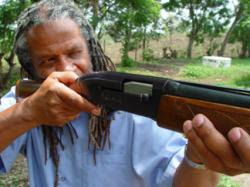 |
| Pete O'Neal then ... |
“I’m kind of lost in a no man’s land” – Pete O’Neal
Will the great battles of the Sixties ever be completely ended?
For Pete O’Neal, a former Black Panther leader, that tumultuous decade continues to cast a long shadow. For nearly four decades he has lived in exile, unable to return to the United States. While he has built a fulfilling life in his adopted home of Tanzania, this onetime radical is haunted by a sense of loss, and by a growing estrangement from the country he once fought so hard to change.
Writer/director Aaron Matthews' award-winning film A Panther in Africa is a moving 90-minute portrait of Pete O'Neal and his struggle to come to grips with the legacy of his past.
 |
| ...and now |
In 1968, O’Neal founded the Kansas City chapter of the militant African-American revolutionary organization known as the Black Panther Party. Arrested on gun charges, he fled the U.S. with his wife Charlotte two years later, eventually settling in a village near the city of Arusha, Tanzania.
Today, the O’Neals run the United African Alliance Community Center, a modest but well respected organization that provides education, training and other much-needed social services for Tanzanians. Through the UAACC, the couple put their Sixties ideals into action.
In news footage from his Black Panther heyday, O’Neal appears as the model of an angry young radical in severe black shades, talking matter-of-factly about violent revolution. It’s an amusing contrast with the man he has become decades later: a grumpy, grandfatherly figure with graying dreadlocks who dotes on his wife, frets about his blood pressure, and spends his days fussing over broken water pipes and the cost of new computers for the community centre.
Though Pete O’Neal has found contentment and a sense of purpose in his present life, the past isn’t done with him yet. His youthful, pre-Black Panthers career as a predatory street hustler is a source of constant regret – and the reason he has committed himself to community work. “This is my salvation,” he says.
More troubling still is a growing sense of disconnection from his African-American identity. When a pair of inner-city teens arrive as part of an exchange program, O’Neal discovers he has little in common with these reflections of his youthful self. After years in exile, he has become a man without a country – a sobering reminder of the price that many idealists, past and present, have paid for dreaming of changing the world.
For more on A Panther in Africa, visit the film's Web site.

No comments:
Post a Comment